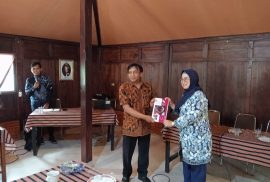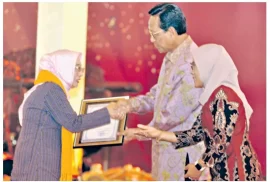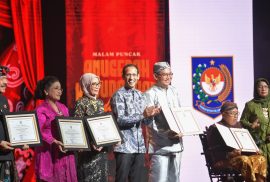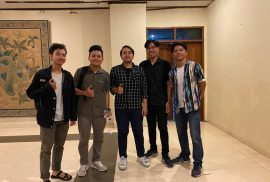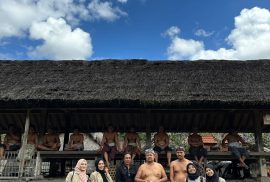Sleman (9/11/2023) – The Faculty of Cultural Sciences of Universitas Gadjah Mada (FIB-UGM) and the Sleman Regency Cultural Office (Kundha Kabudayan) presented the results of a study of intangible cultural objects that have the potential to be designated as the Ministry of Education and Culture’s Intangible Cultural Heritage (WBTB) at Puri Mataram, Sleman. The presentation of this study is intended to provide recommendations for the Culture Office in determining WBTB.
“There are ten cultural objects found in four sub-districts, including in Minggir, Tempel, Pakem, Turi,” said Imam Prakoso as the head of the inventory and WBTB study team from FIB at Puri Mataram on 9 November 2023.
Furthermore, according to Imam, the ten cultural objects include art, traditional knowledge, and oral tradition. In the scope of art, there are sholawat katolik, sholawat pitutur, rodat, keroncong tunas mekar, and reog campursari eko budoyo. Meanwhile, traditional knowledge includes the culinary delights of duck bacem nglengis, jamu gendong gesikan, and the market economy system. The last is oral tradition in the form of ngelmu titen Gunung Merapi and the Legend of Turgo Hill.
“Every cultural object has the potential to be designated as WBTB, but it needs to be considered again in accordance with the context of the implementation of the Law on Cultural Promotion Objects,” said Imam.
In addition, the Head of the Intangible Cultural Heritage Division, Dekhi Nugroho, said that the purpose of this activity is the first step to determine intangible cultural heritage. This is related to the unevenness of the types of culture designated from the Sleman Regency area, apart from the realm of art.
“The establishment of intangible cultural heritage is still minimal in the field of art. Therefore, the inventory and study of intangible cultural heritage aims to look more broadly at the potential of other forms of culture such as traditional knowledge embodied by culinary, so that it can be optimised into the economic realm to advance the welfare of the community,” said Dekhi.
The Dissemination of Inventory and Study of WBTB of Sleman Regency 2023 involved a team of lecturers from Faculty of Arts UGM consisting of Imam Prakoso, M.A, as the chairman with members Dr. Mimi Savitri, M.A., Dr. Suzie Handayani, M.A., Agus Indiyanto, M.Si, Aditya Revianur, M.Hum., and Dama Qory Arjanto, M.Si. The team was also assisted by FIB UGM students as cultural data collection assistants, including Ervita Ninda Iswantari Siti Nur Aqidatul Izza Ulfa Ifatul N Ridho Qholbi Nurvania Rachmah.

